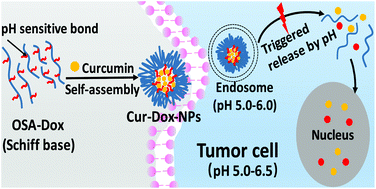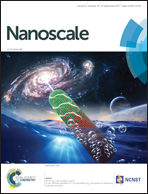pH-Responsive prodrug nanoparticles based on a sodium alginate derivative for selective co-release of doxorubicin and curcumin into tumor cells†
Abstract
In order to realize a combination of chemotherapy and selective drug release into tumor cells, novel pH-sensitive prodrugnanoparticles were designed and prepared via the self-assembly of a synthetic amphiphilic macromolecular prodrug for the selective co-delivery of doxorubicin (Dox) and curcumin (Cur). Dox was covalently conjugated to the oxidized sodium alginate through a Schiff base reaction to produce an amphiphilic macromolecular prodrug, and the prodrug was subsequently self-assembled into nanoparticles (Dox-NPs) in an aqueous solution, which were responsive to the acidic environment in tumor cells. Additionally, a second chemotherapeutic agent, Cur, was encapsulated in the core of nanoparticles (Cur–Dox-NPs) via hydrophobic effects, with a significant drug loading capacity. Cur–Dox-NPs exhibited an efficient release of both Dox and Cur in acidic media and further studies of their intracellular uptake and drug release confirmed that Dox-NPs were easily taken up by cells and selectively released the drug into the human breast cancer cell line MCF-7. In vitro cytotoxicity studies of the NPs showed a remarkable efficacy against MCF-7 cell lines, whereas an improved safety profile was observed in the human breast epithelial cell line MCF-10A. Furthermore, in vivo studies in zebrafish further confirmed an efficient absorption of Dox-NPs. In vivo cardiotoxicity experiments on a zebrafish model showed that Dox-NPs exhibited an improved cardiotoxicity profile in comparison with free Dox. This study demonstrated that this novel pH-sensitive prodrug-nanoparticle system may provide a simple and efficient platform for the selective co-delivery of multiple drugs to tumor cells.



 Please wait while we load your content...
Please wait while we load your content...